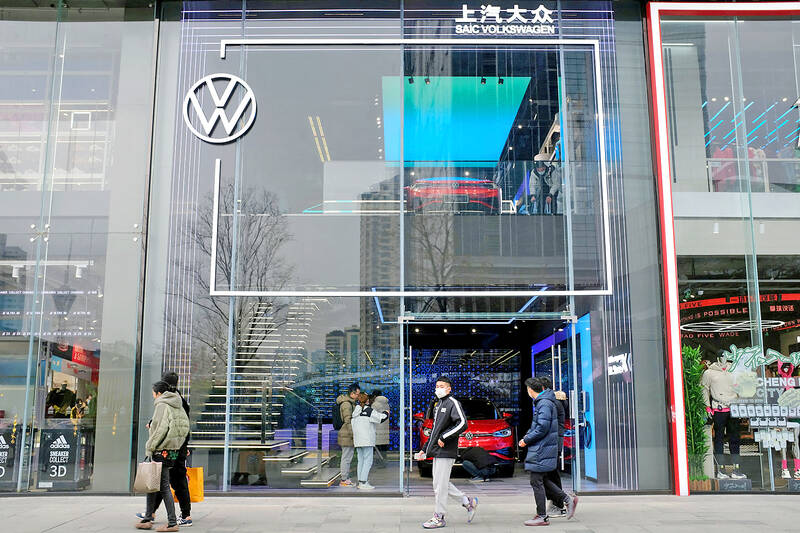German automaker Volkswagen (VW) on Wednesday said that it was discussing the future of its activities in China’s troubled Xinjiang region, following fresh allegations of human rights abuses.
The Handelsblatt daily reported that forced labor might have been used to build a test track in Turpan, Xinjiang, in 2019.
VW said it had seen no evidence of human rights violations in connection with the project, but vowed to investigate any new information that came to light.

Photo: Reuters
In an apparent sign of the growing pressure on the group over its presence in the region, VW added that it was in talks with its Chinese joint venture partner SAIC “about the future direction of business activities in Xinjiang.”
“Various scenarios are currently being intensively examined,” VW said in a statement.
Calls have grown louder for VW to reconsider its business activities in the region after German chemicals giant BASF SE last week announced that it would accelerate its exit from two joint ventures in Xinjiang.
Rights campaigners have for years accused Beijing of a brutal crackdown against Uighurs and other Muslim minorities in Xinjiang, including through forced labor and detention camps.
Beijing denies allegations of abuse and insists its actions have helped to combat extremism and enhance development.
Xinjiang is home to numerous factories that supply multinational companies, including big Western brands.
VW has long come under scrutiny over its factory in Urumqi, Xinjiang, which opened in 2013 and in which it has a stake via its joint venture partner SAIC.
An external audit commissioned by VW last year found no evidence of forced labor among the plant’s 197 employees, but the consultancy that wrote the report acknowledged “the challenges in collecting data” for audits in China.
The Turpan test track was not part of the audit.
Politicians from German Chancellor Olaf Scholz’s three-way coalition between the Social Democrats, the Greens and the pro-business Free Democratic Party have added to pleas for VW to quit the region.
Xinjiang “must become a no-go area for the economic activities of Western companies, including VW,” Renata Alt, chair of the German parliament’s human rights committee, told the Tagesspiegel newspaper.
“The human rights situation in Xinjiang is so catastrophic and intransparent that German companies should not operate there,” German lawmaker Frank Schwabe said.
Germany’s BASF led the way on Friday last week when it declared it would speed up the sale of its stakes in two companies in Xinjiang, citing mainly environmental and commercial reasons, but the move came after broadcaster ZDF and news outlet Der Spiegel said staff from its Chinese joint venture partner Markor were alleged to have been involved in Uighur rights abuses.
According to the reports, Markor staff had taken part in visits to homes of Uighur families to spy on them.
The German company said regular audits had shown no evidence of rights violations at the two joint ventures, but that the media reports “contain serious allegations that indicate activities inconsistent with BASF’s values.”

Intel Corp chief executive officer Lip-Bu Tan (陳立武) is expected to meet with Taiwanese suppliers next month in conjunction with the opening of the Computex Taipei trade show, supply chain sources said on Monday. The visit, the first for Tan to Taiwan since assuming his new post last month, would be aimed at enhancing Intel’s ties with suppliers in Taiwan as he attempts to help turn around the struggling US chipmaker, the sources said. Tan is to hold a banquet to celebrate Intel’s 40-year presence in Taiwan before Computex opens on May 20 and invite dozens of Taiwanese suppliers to exchange views

Application-specific integrated circuit designer Faraday Technology Corp (智原) yesterday said that although revenue this quarter would decline 30 percent from last quarter, it retained its full-year forecast of revenue growth of 100 percent. The company attributed the quarterly drop to a slowdown in customers’ production of chips using Faraday’s advanced packaging technology. The company is still confident about its revenue growth this year, given its strong “design-win” — or the projects it won to help customers design their chips, Faraday president Steve Wang (王國雍) told an online earnings conference. “The design-win this year is better than we expected. We believe we will win

Chizuko Kimura has become the first female sushi chef in the world to win a Michelin star, fulfilling a promise she made to her dying husband to continue his legacy. The 54-year-old Japanese chef regained the Michelin star her late husband, Shunei Kimura, won three years ago for their Sushi Shunei restaurant in Paris. For Shunei Kimura, the star was a dream come true. However, the joy was short-lived. He died from cancer just three months later in June 2022. He was 65. The following year, the restaurant in the heart of Montmartre lost its star rating. Chizuko Kimura insisted that the new star is still down

While China’s leaders use their economic and political might to fight US President Donald Trump’s trade war “to the end,” its army of social media soldiers are embarking on a more humorous campaign online. Trump’s tariff blitz has seen Washington and Beijing impose eye-watering duties on imports from the other, fanning a standoff between the economic superpowers that has sparked global recession fears and sent markets into a tailspin. Trump says his policy is a response to years of being “ripped off” by other countries and aims to bring manufacturing to the US, forcing companies to employ US workers. However, China’s online warriors